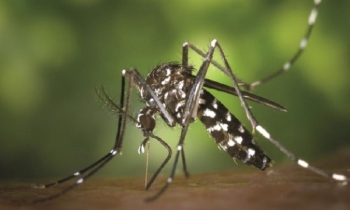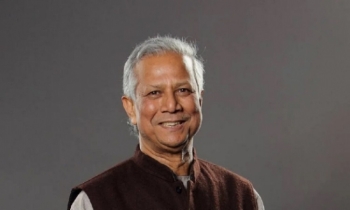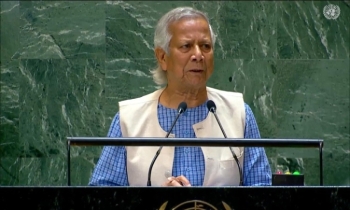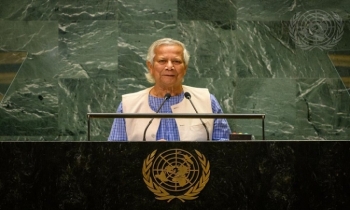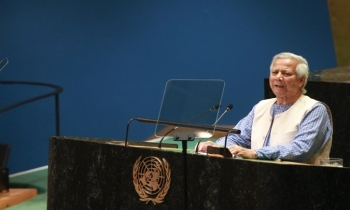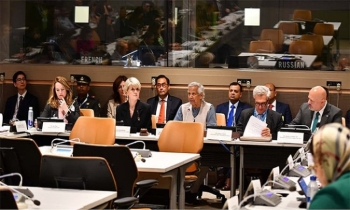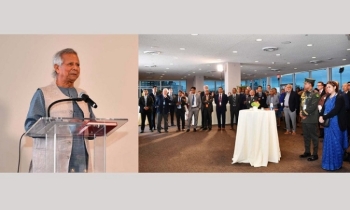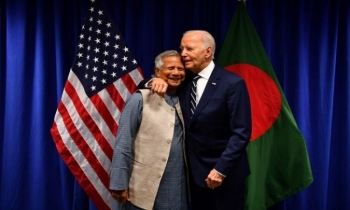Bangladesh in world media this week
BI Desk || BusinessInsider

Photo: Freepik
Bangladesh was mentioned in internationally recognised media outlets over this week. The mentions were not always positive, but they were not all negative either. As the country marked its 50 years of liberation war victory over Pakistan, most international media covered stories related to its achievements since 1971.
Here are our top 10 picks for this week:
Bangladesh celebrates 50 years of independence
The BBC published an article on the day of Bangladesh’s 50 years of victory. The report said, it’s been 50 years since Bangladesh first began the fight for independence, which resulted in it breaking away from Pakistan to become a separate country.
Before this, the area that is now Bangladesh was known as East Pakistan.
In March 1971 the liberation war started, which lasted for nine months and ended with Bangladesh officially having its status as an independent nation recognised on 16 Dec 1971.
Bangladesh Independence Day is celebrated on 26 March every year to mark the day Sheikh Mujibur Rahman - who would later become Bangledesh’s first leader - declared independence, before the war began.
To fully understand the background of this fight for freedom we need to go even further back in time to 1947, when India won its independence from the British.
At this time India was a huge country, even bigger than it is today, but after British rule there ended the country split into two new states: India and Pakistan, who would both rule themselves.
Pakistan was split across two areas - Pakistan and East Pakistan - which were 1,240 miles apart.
Partition happened in this way because the majority of Indian people were part of the Hindu religion, but the people living in the areas that became Pakistan and East Pakistan, were mainly Muslim.
President Kovind begins 3-day visit to Bangladesh to attend 50th Victory Day celebrations
The Hindustan Times reported on December 15 that IndianPresident Ram Nath Kovind on Wednesday embarked on a three-day State visit to Bangladesh to participate in the 50th Victory Day celebrations in Dhaka.
“Beginning Wednesday, President Kovind will be on a State visit to Bangladesh. The visit will be from December 15-17. This visit is in context of 50th Victory Day celebrations in Dhaka at which Bangladesh President Abdul Hamid has invited President Kovind to represent India as a guest of honour,” Foreign Secretary Harsh Vardhan Shringla said on Tuesday during a press briefing.
This is the first visit of President Kovind to Bangladesh since the Covid-19 outbreak.
President Ram Nath Kovind on Wednesday embarked on a three-day State visit to Bangladesh to participate in the 50th Victory Day celebrations in Dhaka.
“Beginning Wednesday, President Kovind will be on a State visit to Bangladesh. The visit will be from December 15-17. This visit is in context of 50th Victory Day celebrations in Dhaka at which Bangladesh President Abdul Hamid has invited President Kovind to represent India as a guest of honour,” Foreign Secretary Harsh Vardhan Shringla said on Tuesday during a press briefing.
This is the first visit of President Kovind to Bangladesh since the Covid-19 outbreak.
“Bangladesh inviting our President to be the guest of honour on this occasion to join to commemorate this event at which he is the only foreign dignitary who will be represented. At the same time, our president going out for the first time since the COVID pandemic is also very significant,” Shringla said.
Emphasising that the visit of the President provides an opportunity to renew India’s bonds with Dhaka, Shringla said that the relations are based on a shared geographical space, heritage, history and shared experience of New Delhi’s support to Bangladesh during its war of liberation.
“It is also an occasion to take note of the width, depth, vitality and dynamism of the contemporary ties,” Shringla added.
During the visit, the President will hold a delegation-level meeting with Hamid. Meanwhile, Bangladesh Prime Minister Sheikh Hasina and Foreign Minister Dr A K Abdul Momen are scheduled to call upon the President, the Ministry of External Affairs had earlier said in a press release.
US imposes sweeping human rights sanctions on China, Myanmar and North Korea
The United States on Friday imposed extensive human rights-related sanctions on dozens of people and entities tied to China, Myanmar, North Korea and Bangladesh, and added Chinese artificial intelligence company SenseTime Group to an investment blacklist, Reuters reported on December 10.
Canada and the United Kingdom joined the United States in imposing sanctions related to human rights abuses in Myanmar, while Washington also imposed the first new sanctions on North Korea under President Joe Biden’s administration and targeted Myanmar military entities, among others, in action marking Human Rights Day.
The measures are the latest in a raft of sanctions timed to coincide with Biden’s two-day virtual Summit for Democracy, where he announced initiatives to bolster democracy around the world and support for pro-democracy legislation in the United States.
Biden said on Friday that commitments made by some of the more than 100 world leaders at the summit would push back against rising autocracy around the world, fight corruption and promote human rights.
Bangladesh protests US sanctions of its security chiefs
Yahoo News via AFP on December 11 reported that Bangladesh called in the US ambassador to protest sanctions by Washington against its top security officers after seven people including the country’s national police chief were accused by the Biden administration of human rights abuses.
Washington imposed sanctions against the Rapid Action Battalion (RAB), which is accused of involvement in hundreds of disappearances and nearly 600 extrajudicial killings since 2018.
Seven current or former officials of the Rapid Action Battalion were also sanctioned. They include Benazir Ahmed, previously the RAB chief and currently the national head of the South Asian country’s more than 2,00,000-strong police force.
Bangladesh officials were quick to denounce the move, with foreign secretary Masud Bin Momen summoning the US ambassador “to convey Dhaka’s discontent” over the decision, his ministry said.
One of the sanctioned individuals, RAB deputy chief KM Azad, defended the force’s operations, saying it never violates human rights.
But local rights activists welcomed the measures.
RAB was created in 2004 by the then Islamist-allied government to combat extremism and serious crimes in the country of 169 million people.
But it has been dogged by controversies and accused of gross human rights violations, including staging gunfights to kill alleged criminals.
In January 2017, a Bangladesh court sentenced 26 people including 16 RAB officers to death after they were found guilty of involvement in the abduction and murder of seven people in the central city of Narayanganj.
Bangladesh reports first cases of Omicron COVID-19
Chinese news agency, Xinhua on December 11 reported Bangladesh’s detection of its first cases of the Omicron variant of Covid-19.
The Omicron variant was detected in two female cricketers of the Bangladesh Cricket Team, the health minister said, adding the cricketers returned to the country recently from Zimbabwe.
They are now in institutional isolation at a hotel in Dhaka, and their condition is currently stable, he said.
The minister said all necessary measures have been taken over the new coronavirus variant.
The Bangladesh government has recently made 14 days institutional quarantine mandatory for those returning from seven African countries as part of precautionary measures to rein in the new variant of the COVID-19.
Bangladesh bans air rifles to protect migratory birds
Bangladesh has banned air rifles to protect hundreds of vulnerable bird species, a top environmental official said on Thursday, as flocks of migratory birds arrive in the country to survive the winter months in a warmer climate, reported the Arab News.
Bangladesh has more than 700 bird species, 388 of them migratory birds coming from China, Russia, Kazakhstan, Mongolia and Uzbekistan, according to Bangladesh Bird Club data.
The number of migratory birds, which spend on average seven months in the country, has been declining due to climate change and illegal hunting. Authorities estimate that 125,000 migratory birds flew to Bangladesh this year, 20,000 less than during the previous winter. While wildlife hunting was outlawed in Bangladesh more than three decades ago, air guns remained legal as they did not fall under the “lethal weapon” category. The government ban on carrying and using air rifles came into effect on Wednesday.
The move was welcomed by environmentalists, who are urging the government to increase fines and jail terms for poachers.
Under the country’s wildlife protection laws, the maximum punishment is a year’s imprisonment and a fine of $1,200.
The former country director of the International Union for Conservation of Nature, Prof. Niaz Ahmed Khan, said it was the first time the Bangladeshi government had banned the use of pneumatic weapons.

